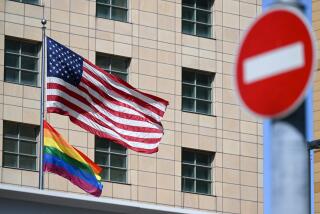True Patriots Act
Given today’s war-on-terrorism rhetoric, it’s no surprise that patriotism dominates U.S. political discussions. Some of the more controversial parts of the Patriot Act are up for renewal, and the House of Representatives, after questioning a handful of its provisions, has approved the document. The debate on the merits of the act invariably has focused on the keen divide between the value of civil liberties and the imperatives of national security. Liberals worry about the Orwellian nature of the Patriot Act, while conservatives stress the necessary sacrifices in personal freedom required in the age of terrorism.
But something vital has been lost in this debate — namely, the disturbingly limited way in which many public officials define patriotism. Exactly when and how did patriotic feeling get defined in such reactive, negative terms? Since when does being patriotic require not so much a commitment to positive ideals and actions but, rather, to gestures that encourage an atmosphere of fearful watchfulness, xenophobia and the surrender of our freedoms?
Defenders of the Patriot Act insist that patriotism entails giving up some individual privacy to guard against the possibility of a terrorist attack from within or without. But patriotism also concerns a love of privacy and free speech and, not least important, a spirited willingness to defend those ideals.
Patriotism consists of multiple, positive actions on behalf of the United States — registering voters, working in an AIDS hospice, volunteering at a disadvantaged school or raising questions about the Bush administration’s full-throttle militarism. Almost no one today discusses the idea of national service that would require young people of different ethnicities and economic backgrounds to come together for community projects, not military ones. The most disturbing aspect of the New Patriotism is its suggestion that dissent about the war in Iraq — or even a simple questioning of progress there — is unpatriotic.
Patriotism was not always so jingoistically defined. As the Princeton political scientist Maurizio Viroli argues in “For Love of Country,” it was once a positive public virtue. According to the civic republican tradition (a tradition that includes thinkers as diverse as Machiavelli and Rousseau), patriotism was love not so much of country but of its republican forms and their traditions.
In Viroli’s account, the good patriot makes sacrifices, works hard to preserve republican values and participates in civic life. This version of patriotism emphasizes positive freedom — our ability to act on our own behalf for the sake of the freedom of the republic — as opposed to negative liberty — passively allowing the state to protect us and in the process rob us of our liberties. The patriot works aggressively to defend the freedoms that make a people a republic.
The specter of a passive citizenry surrendering its rights is sadly pertinent — as is the danger of not distinguishing between patriotism and nationalism. Patriotism, in the tradition outlined by Viroli, is an activist, participatory ideal. By contrast, nationalism is largely symbolic, and at its worst mere spectacle. (Witness the attempt by Congress to draft a constitutional amendment criminalizing flag burning.)
American historians remind us of those more enlightened moments in our history when patriotic feeling entailed a range of populist causes. Gordon S. Wood and Bernard Bailyn have separately documented the ways in which the Founding Fathers drew on classical republican ideals as they forged the ideology of a new nation.
Michael Kazin distinguished between patriotic sentiment and nationalistic passion. In “The Populist Persuasion,” he wrote, “[In the] late 1930s, under the aegis of the New Deal, institutional patriotism was flourishing: the opening of the Jefferson Memorial and the National Archives (displaying immaculately preserved copies of the Constitution and the Declaration of Independence) and WPA’s sponsorship of historic guides and murals all connoted a sunny view of the American prospect.”
We should reflect on these earlier traditions in American history. Although appeals to patriotism are almost always used for repressive purposes, a patriotic position should not be simply grounded in a citizen’s reflexive acceptance of fear and surveillance. It is also an active involvement in civic life.
There is always a negative side to patriotism in wartime. But in the climate created by the various “wars” in which the United States is involved today, there is no positive side — no higher task or mission is offered to people for which they can make real sacrifices. Other than spy on our neighbors and wrap oneself in the flag, our government asks little from its citizenry (it even is letting its citizens pay less in taxes and declines to establish a military draft).
Generating a culture of nervous suspicion, the Patriot Act outlandishly distorts an American tradition of patriotic thinking and action.
More to Read
Start your day right
Sign up for Essential California for news, features and recommendations from the L.A. Times and beyond in your inbox six days a week.
You may occasionally receive promotional content from the Los Angeles Times.






